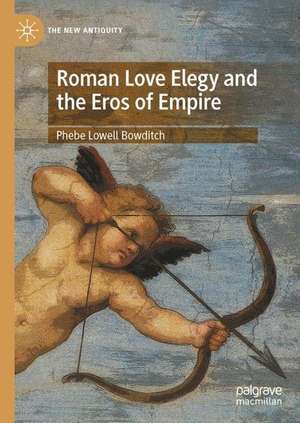Roman Love Elegy and the Eros of Empire: The New Antiquity
Autor Phebe Lowell Bowditchen Limba Engleză Hardback – 23 mai 2023
Preț: 786.36 lei
Preț vechi: 958.98 lei
-18% Nou
Puncte Express: 1180
Preț estimativ în valută:
150.52€ • 163.55$ • 126.52£
150.52€ • 163.55$ • 126.52£
Carte tipărită la comandă
Livrare economică 21 aprilie-05 mai
Preluare comenzi: 021 569.72.76
Specificații
ISBN-13: 9783031147999
ISBN-10: 3031147995
Pagini: 330
Ilustrații: XV, 330 p. 5 illus. in color.
Dimensiuni: 148 x 210 x 27 mm
Greutate: 0.57 kg
Ediția:2023
Editura: Springer International Publishing
Colecția Palgrave Macmillan
Seria The New Antiquity
Locul publicării:Cham, Switzerland
ISBN-10: 3031147995
Pagini: 330
Ilustrații: XV, 330 p. 5 illus. in color.
Dimensiuni: 148 x 210 x 27 mm
Greutate: 0.57 kg
Ediția:2023
Editura: Springer International Publishing
Colecția Palgrave Macmillan
Seria The New Antiquity
Locul publicării:Cham, Switzerland
Cuprins
1.Reading Elegy Against the Grain.- 2.Osiris, Egypt, and Postcolonial Ambivalence in Tibullus 1.7.- 3.Elegiac Cartography and Roman Conceptions of Space.- 4.Imperial Luxury and the Elegiac Mistress.- 5.The Elegiac Triumph: Imperial Pomp and Erotic Circumstance.- 6.Augustan Visions of Hellenism and Roman Imperial Identity.- 7.Isis-Io, Egypt, and Cultural Circulation.-Afterword: The Meroë Head of Augustus
Notă biografică
Phebe Lowell Bowditch is Professor of Classics at the University of Oregon, USA. She is the author of Horace and the Gift Economy of Patronage (2001), A Propertius Reader. Eleven Selected Elegies (2014), and articles on Tibullus, Propertius, Ovid, Horace, and issues of translation.
Textul de pe ultima copertă
“A high quality, original contribution to the field of classical studies across both postcolonial classical studies in general and Latin literary studies in particular. Phebe Lowell Bowditch has set the standard in this area for the last twenty years and to have her important research gathered into a single summative statement will be of great value for the discipline.”—Professor Alison Keith, University of Toronto
This book explores Roman love elegy from postcolonial perspectives, arguing that the tropes, conventions, and discourses of the Augustan genre serve to reinforce the imperial identity of its elite, metropolitan audience. Love elegy presents the phenomena and discourses of Roman imperialism—in terms of visual spectacle (the military triumph), literary genre (epic in relation to elegy), material culture (art and luxury goods), and geographic space—as intersecting with ancient norms of gender and sexuality in a way that reinforces Rome’s dominance in the Mediterranean. The introductory chapter lays out the postcolonial frame, drawing from the work of Edward Said among other theorists, and situates love elegy in relation to Roman Hellenism and the varied Roman responses to Greece and its cultural influences. Four of the six subsequent chapters focus on the rhetorical ambivalence that characterizes love elegy’s treatment of Greek influence: the representation of the domina or mistress as simultaneously a figure for ‘captive Greece’ and a trope for Roman imperialism; the motif of the elegiac triumph, with varying figures playing the triumphator, as suggestive of Greco-Roman cultural rivalry; Rome’s competing visions of an Attic and an Asiatic Hellenism. The second and the final chapter focus on the figures of Osiris and Isis, respectively, as emblematic of Rome’s colonialist and ambivalent representation of Egypt, with the conclusion offering a deconstructive reading of elegy’s rhetoric of orientalism.
Phebe Lowell Bowditch is Professor of Classics at the University of Oregon, USA. She is the author of Horace and the Gift Economy of Patronage (2001), A Propertius Reader. Eleven Selected Elegies (2014), and articles on Tibullus, Propertius, Ovid, Horace, and issues of translation.
This book explores Roman love elegy from postcolonial perspectives, arguing that the tropes, conventions, and discourses of the Augustan genre serve to reinforce the imperial identity of its elite, metropolitan audience. Love elegy presents the phenomena and discourses of Roman imperialism—in terms of visual spectacle (the military triumph), literary genre (epic in relation to elegy), material culture (art and luxury goods), and geographic space—as intersecting with ancient norms of gender and sexuality in a way that reinforces Rome’s dominance in the Mediterranean. The introductory chapter lays out the postcolonial frame, drawing from the work of Edward Said among other theorists, and situates love elegy in relation to Roman Hellenism and the varied Roman responses to Greece and its cultural influences. Four of the six subsequent chapters focus on the rhetorical ambivalence that characterizes love elegy’s treatment of Greek influence: the representation of the domina or mistress as simultaneously a figure for ‘captive Greece’ and a trope for Roman imperialism; the motif of the elegiac triumph, with varying figures playing the triumphator, as suggestive of Greco-Roman cultural rivalry; Rome’s competing visions of an Attic and an Asiatic Hellenism. The second and the final chapter focus on the figures of Osiris and Isis, respectively, as emblematic of Rome’s colonialist and ambivalent representation of Egypt, with the conclusion offering a deconstructive reading of elegy’s rhetoric of orientalism.
Phebe Lowell Bowditch is Professor of Classics at the University of Oregon, USA. She is the author of Horace and the Gift Economy of Patronage (2001), A Propertius Reader. Eleven Selected Elegies (2014), and articles on Tibullus, Propertius, Ovid, Horace, and issues of translation.
Caracteristici
Offers the first in-depth analysis of the elegiac construction of Roman imperialism and its relation to gender Argues that Latin love elegy presents Roman imperialism in a way that reinforces Rome's dominance in the Mediterranean Interprets Roman love elegy from postcolonial perspectives












